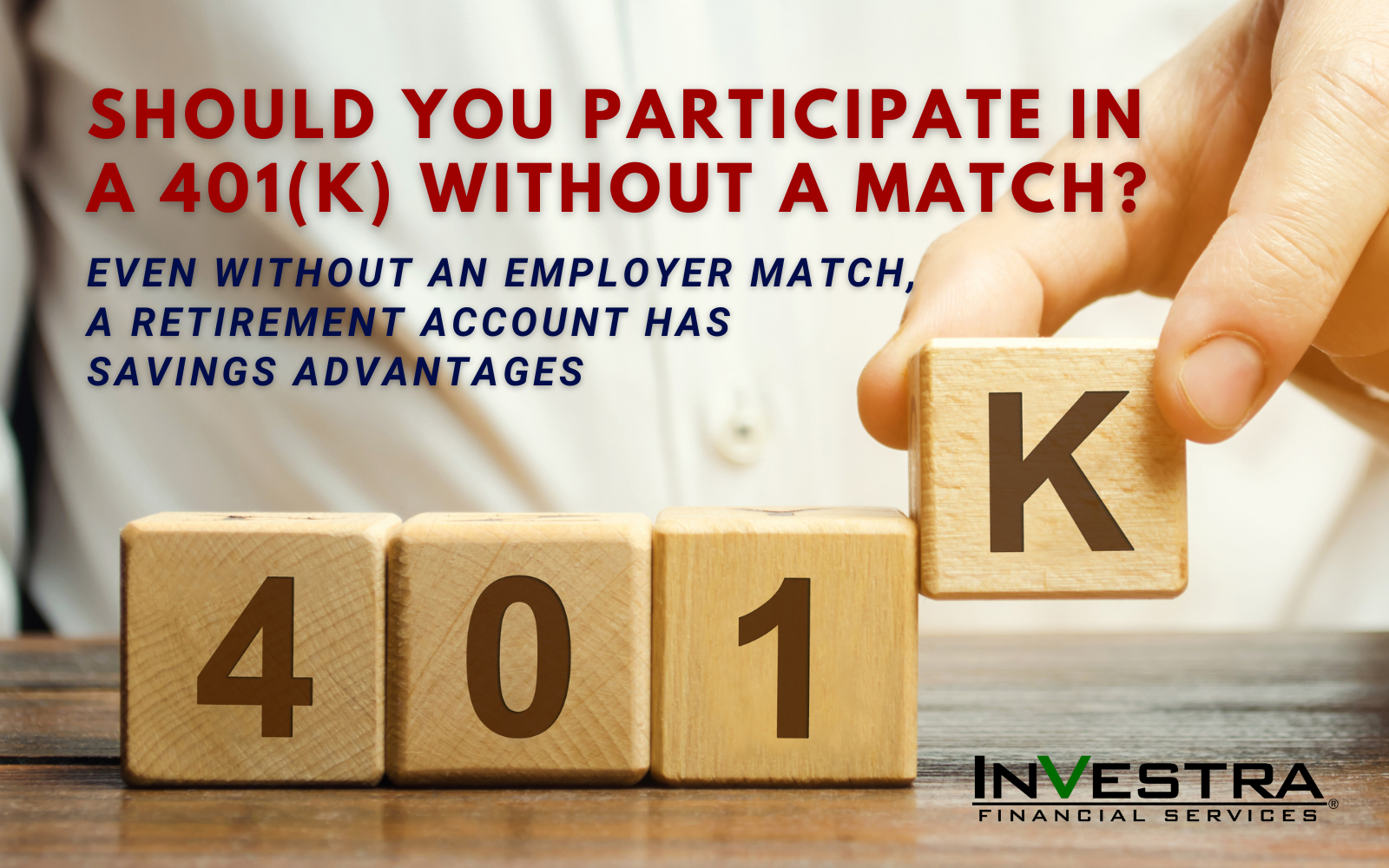One key advantage of 401(k) plans is that employers often provide a matching contribution. Employer matches represent a guaranteed return on your retirement investment, and it almost always makes sense to maximize them.
But if your employer doesn’t offer any match, you may be wondering if you should still participate. The short answer in most cases is that it does still make sense to contribute to a 401(k) because it can offer significant tax advantages. In this article, we’ll look at why participating in a 401(k) plan can still make financial sense and when it may not.
When 401(k) Plans Without a Match Are Worthwhile
The employer matching contribution that is part of many 401(k) plans is an attractive benefit. In some cases, it is equivalent to your employer guaranteeing a 100% return on your investment. However, it’s not the only advantage that 401(k) plans have to offer.
With a traditional 401(k), your contributions to the plan are tax deductible and the account’s earnings over the years will be tax deferred. You won’t owe taxes on any of that money until you withdraw it, usually in retirement. If you contribute to a Roth 401(k), you won’t receive any up-front tax deduction, but all of your withdrawals will be tax-free if you meet certain rules.1
These tax benefits are the same for every standard 401(k) plan, whether your employer makes a matching contribution or not. If you are going to be in a lower income tax bracket in retirement than you are now, as is often the case, then putting your money in a 401(k) could save you thousands of dollars a year in taxes.
Of course, there are other ways of saving for retirement besides a 401(k). A traditional individual retirement account (IRA) works much like a traditional 401(k) when it comes to taxation, and it might offer you a broader range of options for investing your money. (Similarly, a Roth IRA works much like a Roth 401(k).)
However, IRAs have much lower annual contribution limits. For IRAs, the limit for 2022 is $6,000 for anyone under age 50 and $7,000 for those 50 and older; for 401(k)s, the limit is $20,500 or $27,000, respectively. So if you want to save more than $6,000 or $7,000 a year toward retirement, a 401(k) can be a valuable tool regardless of employer contributions.
When 401(k) Plans Without a Match Don’t Make Sense
While it generally makes sense to save for retirement through your 401(k) even if your employer won’t match your contributions, there are a couple of exceptions.
The first exception is if the 401(k) that your company offers is not ideal for you. Some 401(k) plans come with high fees. Others have extremely limited investment options. Still, others may be incompetently run. Even these less ideal plans might be worth participating in if they have a really good employer match. Without a match, you may consider investing in an IRA, a mutual fund, or a brokerage account. You won’t get the same tax breaks but will have more low-fee investment choices.
The second exception is if you are not earning enough income for a large cash flow and are changing jobs frequently. In this circumstance, which is common among younger people at the beginning of their careers, you either may not earn enough to save more than $6,000 toward your retirement (the IRA annual limit) or may not want the hassle of transferring a 401(k) when you switch jobs. So an IRA could make more sense in these cases, and you’ll only have one retirement account to manage.
A Good Match
According to data collected by Vanguard, which administers many 401(k) plans, in 2020, the average value of employer matching contributions was 4.5% of pay. Most employers offered 3% to 6%.
How Vesting Works With A 401(k) Plan
The money that you contribute to a 401(k) plan is immediately vested—meaning that it belongs to you from day one. However, depending on the terms of your plan, any contributions that your employer makes may not vest for several years or may vest partially each year until you are fully vested (cliff vs. gradual vesting).
The Bottom Line
Many 401(k) plans – but not all of them – offer employer matching contributions. Even if your employer doesn’t provide a match, you may want to participate in the plan because of its tax advantages. An exception might be if your 401(k) plan has unusually high fees or poor investment choices, or if you believe it to be badly run.
Calculate Your Time to Retirement With a Financial Advisor
Seeking the guidance of a Wealth Management Professional could be the critical advantage you need to effectively calculate your time to retirement and stay on the right path. At InVestra, our fiduciary advisors specialize in being that resource for you and your loved ones. If you’re ready to discuss your goals with a professional and get started on the path to your dream retirement, contact our office today at 904.880.7878 for more information or request to be contacted by someone on our team using this link (scroll down to the bottom of the page).






